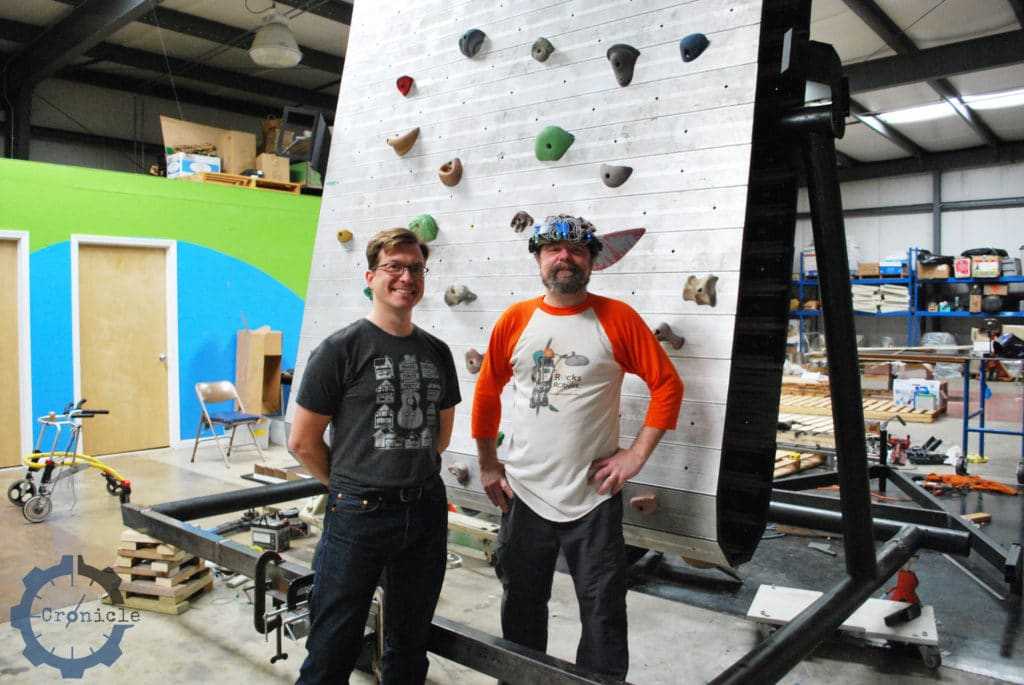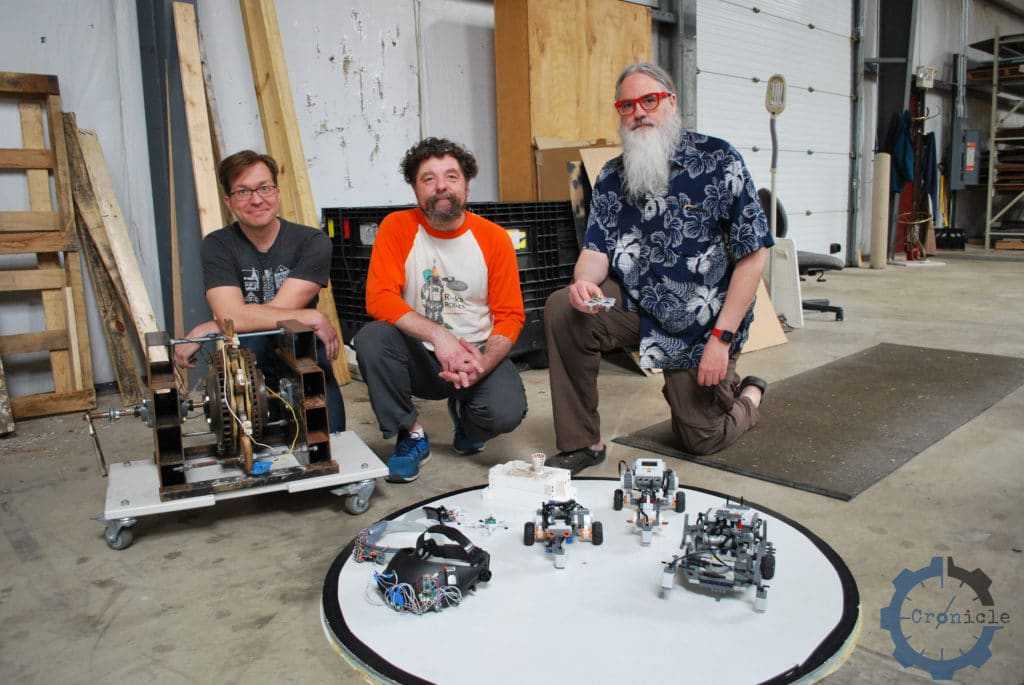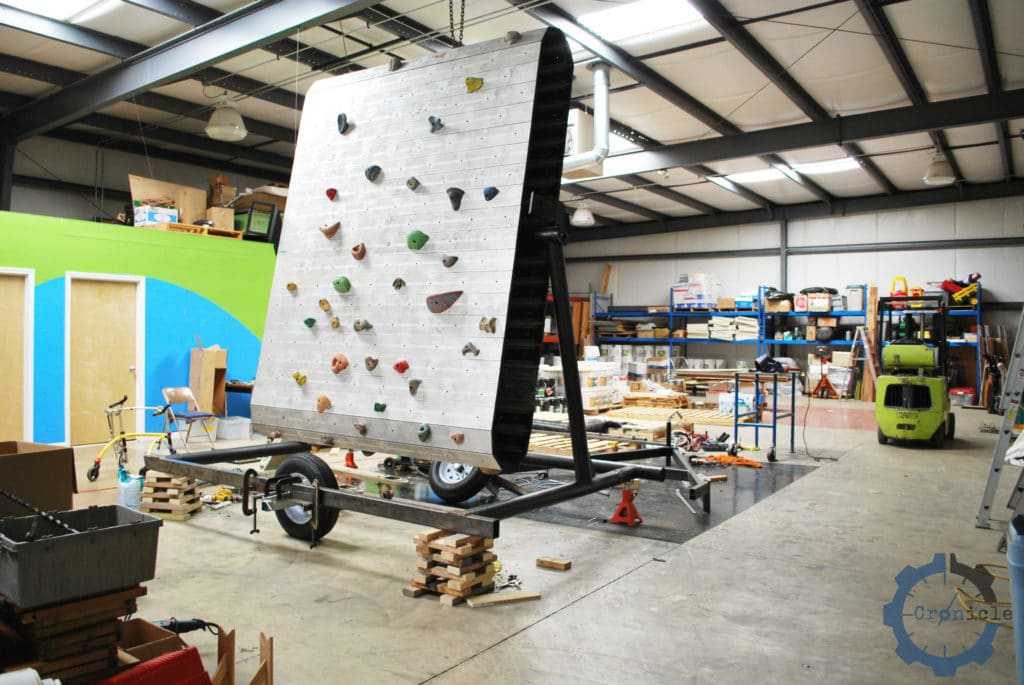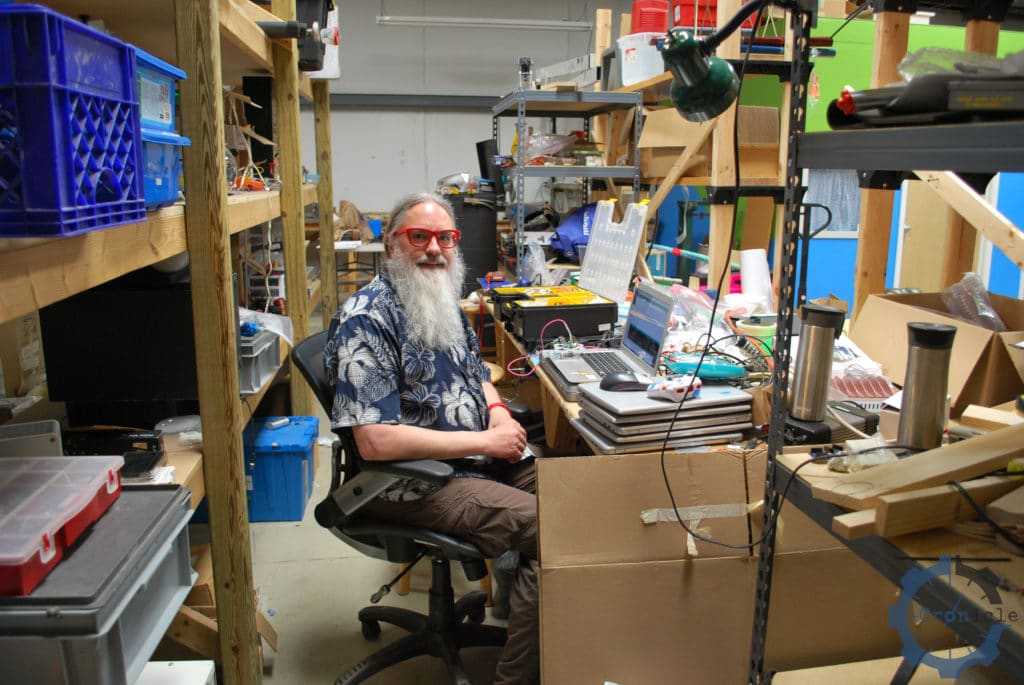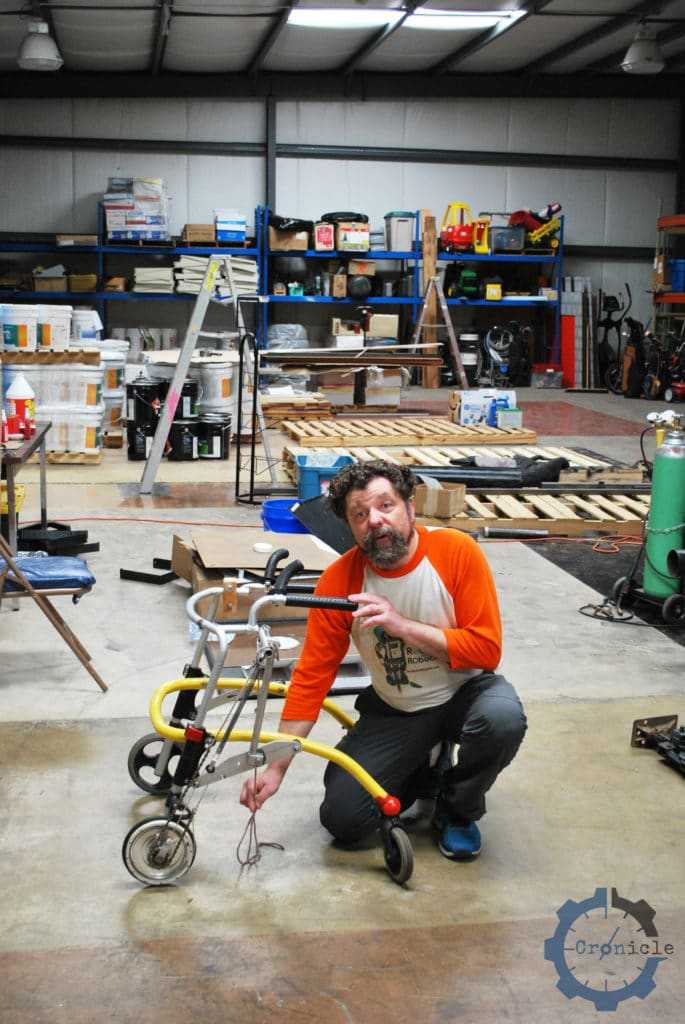Meet The Makers of GoTech, Maker Works & Rocks and Robots Summer Camp
By Laura Cowan
Laura K. Cowan is a tech, business, and wellness journalist and fantasy author whose work has focused on promoting sustainability initiatives and helping individuals find a sense of connection with the natural world.
GoTech members Francis Esmonde-White and George Albercook pose with a headset custom designed for the visually impaired in front of an energy-generating rock climbing wall. In the back left, a walker converted for cerebral palsy awareness advocate Braden Gandee to help with mobility challenges.
In a warehouse space off Jackson Road in west Ann Arbor, members of [GoTech](https://www.maker-works.com/events/go-tech ) that meet at the Maker Works near Zingerman's Bakery in south Ann Arbor are setting up a new workshop. At the center, a large rock climbing wall that has been converted to generate energy is flanked by shelves of supplies and project robots and drones. George Albercook started working as a maker on the side and helping neighborhood homeschooled children learn physics a number of years ago, and it quickly ballooned into popular Maker programs for local tinkers and the Rocks & Robots summer camps for kids interested in robotics.
GoTech volunteers Francis Esmonde-White, George Albercook, and Paul Haas kneel in front of a hand-made generator, a headset for the visually impaired, and several robots and drones they have built with the Rocks & Robots summer camps.
"I don't want to create technology to help people in third-world countries, only to funnel their money back to guys in Silicon Valley," Albercook says. "It makes no sense."
Albercook is deeply invested in using technology for social justice impact. "I don't want to create technology to help people in third-world countries, only to funnel their money back to guys in Silicon Valley," he says. "It makes no sense." That's why Albercook works with volunteers in a group called the Make Good Collective, who are often at a senior level of experience in their engineering careers, to create new and efficient solutions to old problems. These professionals bring a lot of past experience to the project that allows them to hone in on practical solutions in a brief period of time, Albercook says. They often pool their resources and expertise to create solutions to challenges that seem simple on the surface but might give less-experienced engineers the runaround. It's an opportunity that appeals to people who are looking for projects they can volunteer for that make a difference in people's lives.
A climbing wall from climbing gym Planet Rock where Rocks & Robots started hosting summer camps for kids has been converted to generate energy when you climb.
"Take this headset," Albercook says. He picks up a plastic headset covered in electronic sensors, wires, and lights. The headset fits snug around your head like a visor, and it buzzes against your temples or forehead every time you swing your head toward an object or surface closer than about 3 feet. The closer you are, the more consistent the vibration. It's a replacement for a cane for the visually impaired. "It can be calibrated to be more sensitive, and for individual head size," Albercook says. His collaborator Francis Esmonde-White explains further: "It will look more sophisticated in its final version," he says. "It will have many more sensors than this prototype." This is the type of project they work on together with a multitude of other engineers and makers who, like them, often have PhDs in physics, analytical chemistry, robotics, and more. A wealth of knowledge and expertise is flowing into creating solutions for people who otherwise might not be able to afford the complex machinery or software needed for their particular challenge, which might or might not scale well as a mass-produced product.
How did something this complex turn into programs for kids? The idea behind these projects isn't just to help people with new solutions. It's to teach people to think a little differently, in ways that stretch them.
"We have no idea what our kids are going to be doing for a career," Albercook says. "We can't tell them, study this." It's important to teach them how to solve problems, how to explore new technology, and not assume that the computer programming we teach them today is going to be what they need tomorrow. Rather, teach them the skills they can apply to learn new things. "This is the answer: help kids explore their curiosity," Albercook says. "You can see when someone's hand is paralyzed, it shows up in their brain. Unparalyzed, shows up in their brain. Lifelong learning changes your brain. So find something you're passionate about, learn it, and you get better at it, you keep that with you for life."
"We have no idea what our kids are going to be doing for a career," Albercook says. "We can't tell them, study this."
Albercook and Esmonde-White take us outside to show how one of their experienced engineers solved a problem that plagues the third world: fake quinine for treating malaria. Someone on the Make Good Collective team with many years behind them in this line of work quickly identified that quinine is fluorescent in water. Rather than using a spectrometer to identify when quinine is fake, a tool might not be available in remote areas, the engineer pointed out that a simple shadow box made from a cardboard box with pinhole could be shone on a mirror in the box with the quinine on top to see if it projected a purple dot onto the back of the box. "Quinine is present in tonic water," Esmonde-White explains, dropping some tonic water on the mirror in his box under the sun outside the warehouse. A violet hue appeared in the light shining through the box onto its inner wall. "Slide a piece of simple clear plastic over the pinhole, which blocks UV rays, and the purple disappears from the spectrum. Simple," he says.
GoTech volunteer Paul Haas helps with software, hardware, whatever needs engineering.
Albercook, Esmonde-White, and other volunteers for the Make Good Collective meet as a Maker group the second Tuesday of every month down by Zingerman's Bakehouse in south Ann Arbor. You can find more details at the end of this post. Their next meeting is June 11.
Rock & Robots Summer Camps
Want your kids involved in drone building, robotics, and learning engineering skills for the future? Albercook has worked for years to hone a curriculum that allows kids the opportunity to build their own robots and drone copters using the latest tech. The Rocks & Robots summer camp helps kids learn a variety of robotics and programming skills from Albercook and friends. It also gets kids moving with games that are equal opportunity. "I remember when I was a kid I wouldn't want to play if Jimmy was just going to be faster than everyone and I knew I couldn't win," Albercook laughs. "So I make them run around with a ball inside a sock. No one's good at that game. Equal opportunity."
The Rocks & Robots summer camp has become so popular it's now available all summer in Ann Arbor, Plymouth, and Canton. You can see the weekly camps available here to sign up.
The warehouse was piled with projects new and old, and we will be catching up with the Ann Arbor makers for more posts on their projects and initiatives. Albercook showed us a walker he designed to help with cerebral palsy to keep the walker moving up hills, a magnet drone system he developed to help a disabled person pick up objects off the floor from a wheelchair. His imagination, and his engineering knowledge, seems near infinite. He's a born teacher. And above all, it's clear these guys are having a good time and have become great friends along the way. If you would like to see more of the newest projects coming out of the Ann Arbor maker community, or get involved yourself, check out their Facebook page below for more information on their next meeting.
George Albercook demonstrates a walker he altered for Braden Gandee, whose brother carried him on a cross-country hike to bring awareness to cerebral palsy. Albercook switched gears to help with a type of exoskeleton shortly after, to help Gandee develop muscles for walking that couldn't develop enough based on limited access to an exoskeleton at the University of Michigan.
We will be attending a GoTech maker event as soon as we have the time. Meetings are the second Tuesday of every month. The next event takes place June 11. More details below. We will also be catching up with the GoTech guys at the next Maker Faire Detroit, which takes place this year July 27 and 28 and getting involved in their efforts to bring more awareness to the Make Good Collective and Rocks & Robots programs so more people who want to be involved can join with the Maker space and contribute.
Go-Tech (2nd Tuesday every month)
- Tuesday, June 11, 2019
- 7:00 PM - 9:00 PM
- Maker Works 3765 PLAZA DR. ANN ARBOR United States (map)
- GoTech Facebook Group
ann arbor makers, ann arbor robotics, francis esmonde white, george albercook, gotech, maker faire detroit, maker works, paul haas, robotics summer camps, rocks and robots

